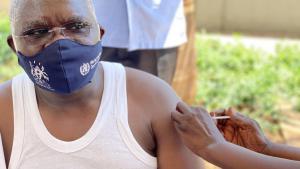WHO provides 3,360 testing kits to Uganda for screening the COVID-19 Omicron variant of concern
Kampala, December 09, 2021: - As part of the prevention and rapid identification of a new COVID-19 variant in Africa, the World Health Organization (WHO) has provided the Uganda Virus Research Institute (UVRI) with a total of 3,360 test kits for the genotyping of variants of concern.
"These PCR screening assay kits procured by WHO is a boost to the county’s existing capacity to identify the predominant Delta variant and indicate the presence of Omicron, the new COVID-19 variant of concern."- Dr. Jane Ruth Aceng, Uganda's Minister of Health.
"Highly operational, these kits offer a triple benefit in preventing and limiting the spread of Omicron and other variants of concern. They will allow rapid identification of the highly transmissible delta variant, screen for Omicron, and help in prioritizing specimens for genomic sequencing."- said Dr Yonas Tegegn Woldemariam, WHO Representative in Uganda.
Dr Yonas added, "the tests are easily shipped, ordering and delivery can be done in 2-3 weeks."
SARS-CoV2 variant B.1.1.529, also known as Omicron, was first identified by scientists in South Africa from a specimen collected on 9 November 2021, with the variant first reported to WHO on 24 November 2021.
A meeting of the World Health Organization's Technical Advisory Panel on Variant Progression, held on 26 November 2021, named it " Omicron” and designated it a variant of concern. This variant is reported to have 26-32 mutations (genetic changes) in the spike protein gene (the virus envelope), which is more than those identified in several other variants of concern, including the Delta and Alpha variants.
These changes could potentially make the virus more transmissible and increase the risk of reinfection.
Currently, WHO is coordinating with a large number of researchers around the world to better understand Omicron. Studies currently underway include assessments of transmissibility, the severity of infection (including symptoms), the performance of vaccines and diagnostic tests, and the effectiveness of treatments.
The government interventions to curb the importation of the Omicron variant include; the management of travellers in and out of the country, through intensified surveillance at point of entry; Increase uptake of COVID-19 vaccines through accelerated mass vaccination campaigns; and adherence to COVID-19 standard operating procedures.
In addition to these measures, Dr Jane Aceng emphasized, “samples from individuals that test positive to COVID-19 will be subjected to genomic sequencing. This will enable laboratories to search for the presence of the Omicron variant or any other variant that may develop in the country."
Public Relations Officer
Ministry of Health, Uganda
Tel: +256 77 922 0588
Email: emmabyoona [at] gmail.com (emmabyoona[at]gmail[dot]com)
Communications Officer
WHO Uganda
Email: tcheutchouae [at] who.int (tcheutchouae[at]who[dot]int)
Public Information Officer
Tel. : +256 313 335569
Cell: +256 786 497073
Email: mwebembezie [at] who.int (mwebembezie[at]who[dot]int)



